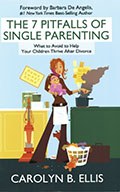
By Carolyn Ellis
Going through separation and divorce can feel like a death – and in many ways it is the death of a lot of dreams, hopes and aspirations you had. Recovering from and coping with divorce is very similar to the grieving process we experience when a loved one dies. We lose an important part of our life.
The divorce process has five stages, which are very similar to the stages people experience in grief. The stages are not necessarily experienced in this order, and people may re-cycle through the stages during their separation process:
- Shock: Whether you initiated the divorce or not, you will be in shock. Your social identity, your economic situation, and your relationship with family and friends all undergo a major readjustment. When you’re in shock, a part of you shuts down and goes into autopilot as a defense from the emotional trauma. You may feel numb or disconnected from your feelings. The shock state is fueled by the fear of “what’s next”—the realization that your old life is ending is scary. This is the stage where literally all you can do is take it one day at a time.
- Anger: In this stage, you connect with your feelings, the ones that are right at the surface—anger, blame, resentment, and anxiety. Like a wounded animal, you lash out in pain against the perpetrator. This is the phase where gossip and blame kick into high gear. In the anger phase, you feel like the victim, and everything is being done “to” you. You enlist others around you into a story of powerlessness because it’s a way to feel support. Blaming others for your misery and receiving sympathy offers a temporary feeling of power. You’re in a reactive mode and generally not willing to be self-reflective. In the anger phase, you can’t see any lesson from the pain of your relationship. In fact, you’re not even open to looking for the lessons.
- Transition: In this phase, the emotional roller coaster really starts to take off. You feel conflicting emotions from one moment to the next. You’re sad and full of regret one minute. Then you’re hopeful and positive about being a single parent the next. You have some sense of yourself as an individual again, not just being identified as “one half” of a couple. In the transition phase, you are more willing to look at your own role in the relationship breakdown and to seek out the wisdom from this crisis.
- Grief: In this phase, you feel consumed by sadness and loneliness. You feel the loss of having an intimate partner to share your life. Even if ending the marriage was your choice and you don’t want to be with that person anymore, you will likely still experience the grief phase. This is the time when you mourn your losses—of your partner, of your vision of you as part of a happily married couple, of your children’s lives under the same roof with their parents, and of your change in your social network.
- Acceptance: You can now accept the old relationship is over. You’re putting the framework for a working partnership with your ex-spouse in place. You feel like you’re moving forward toward a new life. You accept that everything happens for a reason. You are creating a vision of a new future for yourself and your children, which magnetically pulls you forward, out of the heartbreak from the past.
Emotionally digesting your divorce is NOT a linear process. You’ll likely cycle through these various phases while coping with divorce. Trigger events or relationship milestones, such as a wedding anniversary or seeing your ex with a new partner, may plunge you back into one of these phases. Hearing your children talk about their other parent’s new relationship and the inevitability of traditional celebrations, like Valentine’s Day or Christmas, will test you regularly. Over time, your ability to move through to acceptance and the length of time you feel “stuck” in any of the other phases will change.
If you’ve just recently separated and believe that you’re emotionally over the separation or divorce within a short period of time, take a moment to get really honest with yourself. You may simply be “managing” your feelings. It’s important that you allow yourself time for your healing to take place. Otherwise if you rush that process, you inevitably bring those old emotional wounds into your future relationships.








